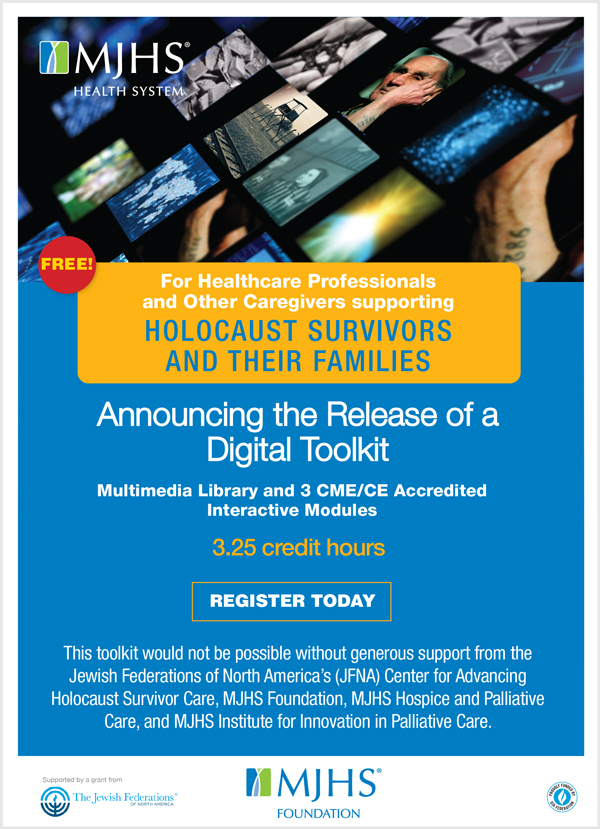I am deeply invested in educating healthcare professionals about the need to treat Holocaust survivors, and survivors of other traumas, at end of life with special care. It is our responsibility, as a society and as healthcare professionals, to ensure that the victims of man’s inhumanity to man will be treated with the utmost sensitivity and empathy in the last months, weeks or days they spend among us.
I congratulate my colleagues from MJHS, under the leadership of Toby Weiss, MSOD, who is the Director of Cultural Sensitivity and Jewish Programming at MJHS Hospice and Palliative Care, for the launching of a new online toolkit for healthcare providers (and others) who want to learn about the experiences that shaped the life of their patients who are Holocaust survivors. The toolkit includes a multimedia library that might be of interest to a broad audience. There is an associated free online course which provides free Continuing Education credits (3.25 Hours) to healthcare providers of a variety of professional disciplines. More information can be found by clicking on the image below. It was my honor to be able to contribute in a variety of ways to the toolkit, including providing a series of 6 webinars to the multimedia library, and a number of published papers that appear in the Articles section. In addition, one of the E-Manuals of the toolkit is largely based on a keynote lecture I gave at an MJHS conference in 2017.
The Holocaust was a catastrophic event that destroyed entire communities and exposed the depth of the darkest, most sadistic human cruelty. It is hard to learn about the atrocities that the survivors witnessed and endured. However, it is necessary that those who are not familiar with these events do so, in order to be able to provide sensitive, compassionate, fully dignifying care to the survivors at the end of their lives. We, healthcare providers, meet our patients when they are frightened and helpless. They are frightened because of the medical conditions that bring them to our care, and because entering the healthcare system can be terrifying, especially for people who were previously victimized by others who had unlimited powers over them.
In recent years, the concept of Trauma-Informed Care has finally taken center stage, as we have recognized the never-ending role that trauma plays in the way people live their lives after massive trauma. Most importantly, trauma can profoundly impact the way people experience the new losses brought about by illness, aging and the death of one’s loved ones. Previous trauma, which was associated with experiences of physical pain, suffering and humiliation, and with the total indifference of others to one’s distress, can be invoked around one’s own end of life, and can require particular sensitivity, patience and understanding from healthcare providers.
The toolkit is focused specifically on understanding aging Holocaust survivors, but the lessons painfully gained through the experiences of survivors are also applicable to survivors of other massive traumatic events. Trauma survivors and their relatives can present healthcare providers with challenges, and the relationships can become difficult in ways that interfere with the quality of care of these patients. Knowledge and understanding of what these people lived through, and how it impacts their reactions in the here-and-now, is critical for allowing well-intentioned healthcare providers deal better with the challenges that caring for trauma survivors may pose. This new toolkit is a tremendous resource, and I am profoundly proud of being part of it.
Irit Felsen


I wish that, at the end of their lives, my parents had been cared for by people who were aware of and sensitive to their special circumstances.
I know. I can feel and identify with your pain. At least we are trying to do as much as we can for those survivors who might still need sensitive care at the end of their lives.
Warmly,
Irit
are you aware of any practitioners in Melbourne Australia that employ this methodology?
I will email you with some information about whom you could contact in Australia to find out more.
Irit